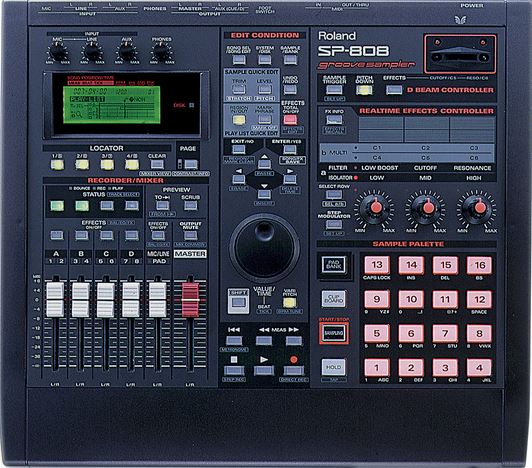A collection of gathered artifacts and original work, towards getting a modern ATAPI device working in a Roland SP-808
These are some findings during my trip down the rabbit hole that is a replacement for the Iomega Zip drive in the Roland SP-808 and SP-808ex samplers.
In the late 90s and early 2000s, the Roland SP-808 was a popular tool for musicians and producers looking to create and manipulate audio samples. One of the most interesting features of this device was its use of zip disks for storing and loading data.
Zip disks were a type of removable storage media that was widely used in the late 90s and early 2000s. They were essentially large capacity floppy disks, capable of storing up to 100MB of data. The Roland SP-808 used zip disks as a way to save and load audio samples, sequences, and other data.
One of the benefits of using zip disks with the Roland SP-808 was the ability to easily transfer data between different machines. Since zip disks were a standard format, it was easy to bring your samples and sequences to a friend's studio or a gig and load them into a different SP-808.
However, there were also some downsides to using zip disks with the SP-808. The main issue was the limited storage capacity of each disk. 100MB might have seemed like a lot at the time, but as audio technology advanced and sample libraries grew larger, it quickly became clear that the zip disk was not a viable long-term storage solution.
Another issue with zip disks was their reliability. They were prone to read errors and could easily become corrupted or damaged, leading to the loss of valuable data. In addition, zip disks were eventually replaced by other, more advanced storage technologies, such as USB flash drives and SD cards.
Despite their limitations, the Roland SP-808 and zip disks remain an interesting relic of the early days of digital audio production. For those who used them, they are a reminder of a time when music production was a more tactile and hands-on process, and when the limitations of technology forced us to be more creative with the tools we had available.
One of the main issues with using zip disks today is finding a working disk drive. Zip disk drives were once a standard feature on personal computers, but they have become increasingly difficult to find in recent years. Even if you have a working drive, it may not be compatible with your current operating system or hardware.
Another challenge with using zip disks is the risk of data loss. Since zip disks are a mechanical storage medium, they are prone to wear and tear and can easily become damaged or corrupted over time. This is particularly true if the disk has been exposed to moisture, heat, or other environmental factors.
In addition to the risk of physical damage, there is also the issue of data compatibility. Many modern software applications and hardware devices do not support zip disk files, making it difficult to access data stored on these disks. This can be particularly frustrating for musicians and producers who have archived their old sample libraries or song files on zip disks.
Finally, there is the issue of data transfer speeds. Compared to modern storage mediums such as USB flash drives or cloud storage, zip disks are incredibly slow when it comes to transferring data. This can make it time-consuming and tedious to move large files or libraries of samples from a zip disk to a modern computer or device.
In conclusion, while zip disks were once a popular and convenient storage medium, using them today presents a number of challenges. From finding a working disk drive to the risk of data loss and compatibility issues, there are many reasons to consider alternative storage solutions for modern music production and personal computing.
